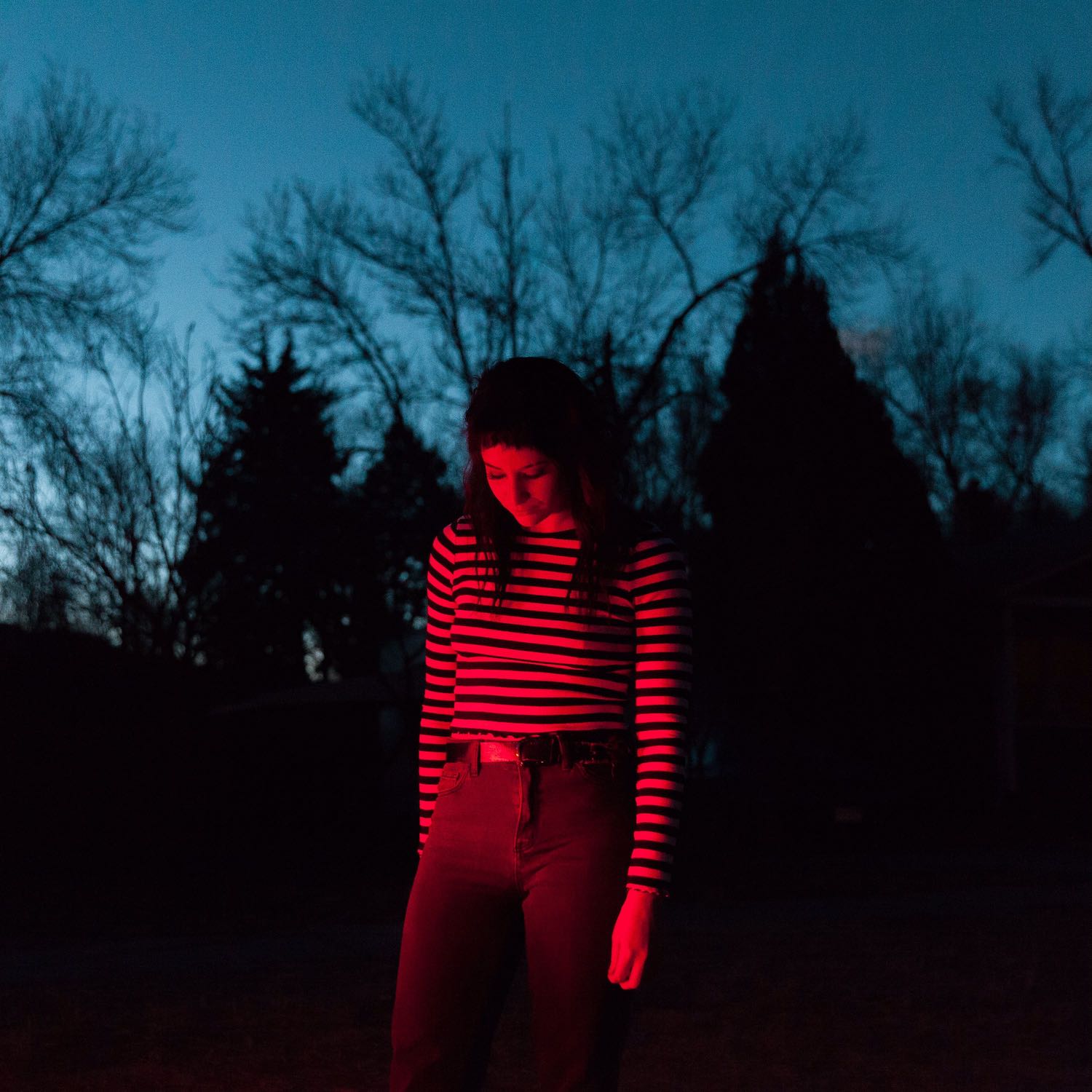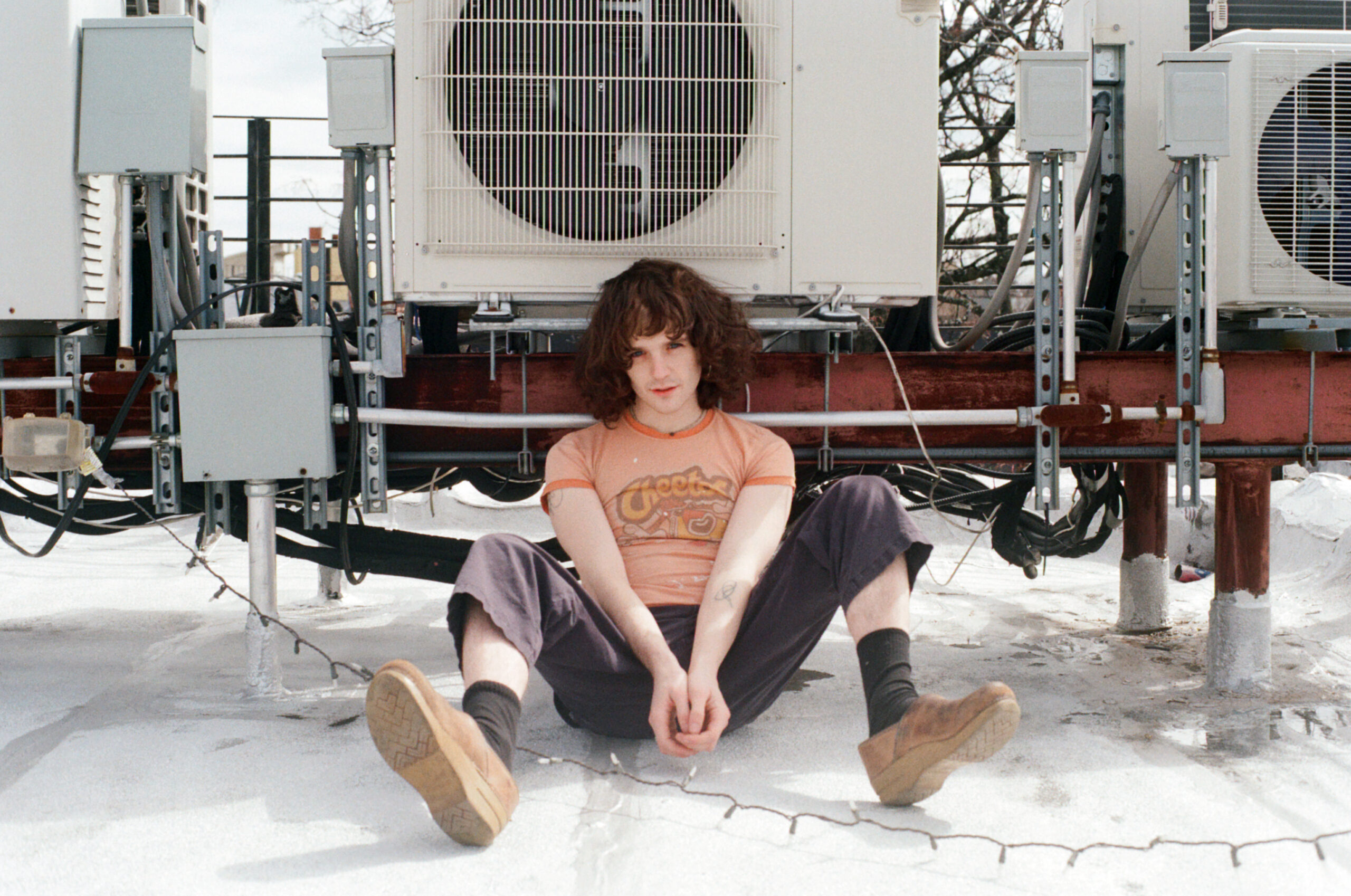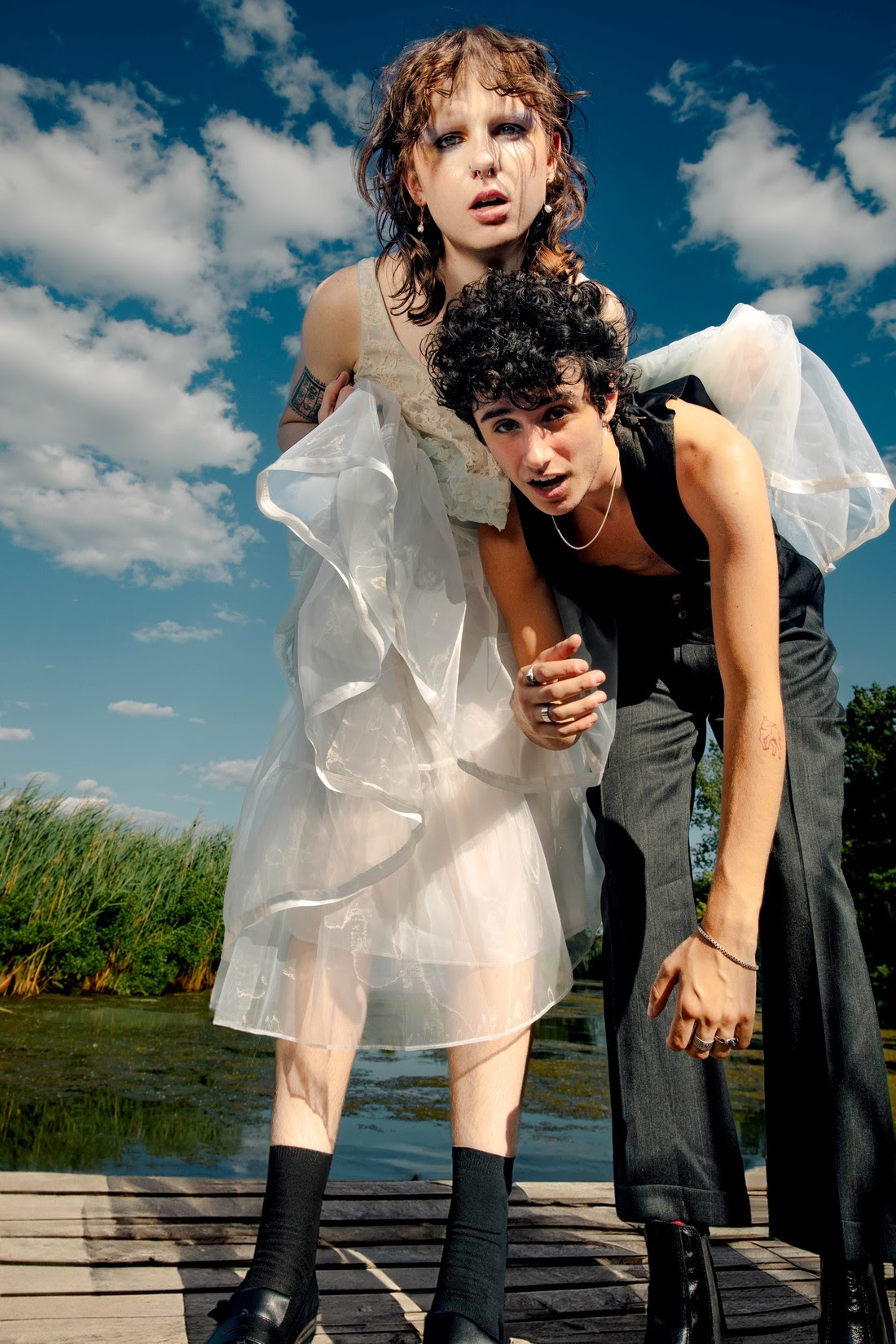There's a specter that hangs over Brianna Hunt's first album as Many Rooms. Occasionally, it can be beautiful, but more often than not it's looming and omnipotent. The Texas-based artist makes the kind of music that allows enough negative space for totalities -- doubt, hope, fear, desire, and the lack of all the above. Or, as the name of its first single goes, "Which Is To Say, Everything." Since she adopted the Many Rooms moniker a couple years ago, Hunt has been working on her debut, called There Is A Presence Here, and the album possesses a patient and methodical nature that makes it both serene and singularly haunting.
Hunt is an extension of a strain of recent musicians, like Julien Baker and Sorority Noise's Cameron Boucher, that take matters of faith and how they relate to mental health seriously. God is all over There Is A Presence Here: as a barometer of self-worth, as a figure to act in opposition to, as one to take solace in. The album soundtracks a lapse in faith, a deep questioning of what it all means. "What if I die and nothing happens? Will my soul decay with me?" Hunt asks in its first lines. "God, I've asked you so many times to free me of the aching," she sings on another song. "Why did you refuse to answer me?" Throughout the album, Hunt is grappling with her personal relationship to God -- divorcing ingrained beliefs and behaviors with a spirituality that fits more into her worldview.
On "Hollow Body" (which you can listen to below), Hunt is mired in inner conflict. "My brittle bones, they can't contain/ The weight of when we speak your name," she sings. "But in spite of everything/ I curse you with the breath you gave me." It's a song that's repurposed from her debut EP, where it served as the title track, but it's rearranged enough to feel significant: Hunt's vocals are more removed, the guitar is swapped out for a whispering piano. There's an additional coda that incorporates Nine Inch Nails' "Hurt"; the inspiration for it didn't come from that version of the song, though, but instead from Johnny Cash's cover, which makes sense given Cash's shared preponderances with faith. And those borrowed lyrics echo Hunt's own struggle well: "And you could have it all/ My empire of dirt/ I will let you down/ I will make you hurt."
There Is A Presence Here was recorded by Randy LeBoeuf (of Trade Wind) in a studio in New Jersey, and it represents a sonic shift for Hunt that abandons more conventional structure in favor of a reality that feels brittle and tenuous. These songs are rarely more than wisps, but they somehow manage to feel towering and all-consuming. It's a testament to Hunt's arresting presence as a songwriter and composer that she can make such sparse songs sound so full, and There Is A Presence Here is the sort of album that makes a lasting impact.
Listen to "Hollow Body" and read an interview with Hunt below.
[videoembed size="full_width" alignment="center"][/videoembed]
STEREOGUM: When did you start playing music?
BRIANNA HUNT: I first started playing when I was 11 or 12 years old. My mom gave me what was her first guitar when she bought a new one, and I started learning on my own with a little bit of her help.
STEREOGUM: What kind of music does your mom make?
HUNT: When I was real young, my mom had never played or sang music before but she felt, I guess, called to do youth worship for her church. She was a new Christian and so she bought her first guitar and learned it on her own. She started singing and practicing at home, so I would hear her all the time in the other room singing worship songs and I would try to do harmonies with her. So that was probably the reason why I wanted to start learning music initially.
STEREOGUM: Did you start playing within the church?
HUNT: Honestly, no. I wanted to really bad but I wasn't really that good. The first time I tried out for youth worship team, I didn't make it. I don't know if it was that I wasn't good enough, I just had nothing to contribute really. They just asked me to try again the next year, but I ended up moving so then I didn't have a church to do that in when I was in middle school. I ended up doing it in later high school years for the worship team. Though I wouldn't say that's what got me into music or what made me want to learn. It was mainly out of a desire to create.
STEREOGUM: How did you decide to create music for yourself and eventually put it out?
HUNT: I started with poetry. Before I learned guitar, I was writing really shitty poems all the time about boyfriends I didn't ever have -- imaginary boyfriends -- and it progressed from there. Once I learned guitar, I'd try to write songs. The first time I ever performed a song I had composed, I was maybe 14 or 15. It was at a talent show and I had written this song about zombies. People really liked it and it made me feel like I could maybe be good at this.
The first real show I played... I had never really been introduced to the music world or the performing world because I lived in this small-ass town in New Mexico where hardly anyone did anything and there weren't venues to play shows in. But I had made this friend who was a senior, and I was a sophomore, and he introduced me to the music scene and showed me all of my favorite bands now. So he asked me if I wanted to open up for this show in Artesia, New Mexico, which was like 45 minutes away, and that was the first time I really performed my own art.
STEREOGUM: So how did you come to release your first EP a few years ago?
HUNT: I've always had recording equipment. Well, not always, but in my senior year I started recording stuff. I wrote "The Father Complex" when I was 17 or 18, and I had it up on SoundCloud for a while. There was a time, I think in 2015, when I was working at this camp on the activities staff and I was getting ready to figure out where I was going to live next. I was trying to figure out what I was going to do with my life and I knew that I wanted to do music, but I didn't really know how.
But, oddly enough, I got a text message from a friend that said, Hey, I have this friend in Denton who would want to record an EP with your for maybe $100, and I said, yeah, that's sounds great and is really cheap. So I ended up driving down to Denton and spent a week there recording what is now the Hollow Body EP, but it was under a different name at the time -- the name Captain, which was really lame. I self-released that, and then a year after that I got signed to Other People Records, and we agreed to re-release that EP under the name Many Rooms.
STEREOGUM: There are obviously similarities between that EP and the new album, but I also feel like your newer material has purposefully less structure and is more ambient. How has your relationship to music changed?
HUNT: I think I intentionally wanted to progress. I didn't want to make the same music twice, because I wanted to write music that reflected me in in my life and my mental state. I don't even know if I intentionally made the songs more obscure or without structure -- I think that kind of came naturally. Or actually, maybe it didn't. Because when I wrote the Hollow Body EP and performed those songs live, I had a friend tell me out of kindness, If you wanna progress, you gotta start writing with different chords and work on doing different kinds of rhythms and change that up because otherwise it'll sound monotonous. And I definitely received that and wanted to be a good artist and progress and change, so I tried a little bit harder to make things different and be a little bit unconventional.
STEREOGUM: I wanted to talk a little bit about how the song "Hollow Body" developed over the years. It now sounds very different from the version that existed on the EP. What went through your mind when you were piecing that together, and how did "Hurt" eventually come into the picture?
HUNT: When I wrote "Hollow Body," I was writing it with a specific idea in mind, but I feel like sometimes the meaning of my own songs will change for me as time goes by because I change. As I got older, "Hollow Body" started meaning more to me because I was struggling more with mental health. I wanted to put "Hollow Body" [on the album] because it was an echo of the old sound. On the EP, that song was the whole theme of it, and because it stayed important to me, I wanted to keep it on the new record. I changed it because I wanted to make it sound darker, a little more ominous. I'm not sure if there was any deep thought behind it -- I just liked the way it sounded and I wanted it to represent a change in my sound and me.
As for the "Hurt" cover... The first time that I heard that song was a long time ago, but it was actually the Johnny Cash version. I didn't even know it was a Nine Inch Nails song at the time. I was listening to Johnny Cash on Spotify or something, and it came on and just wrecked me. I don't know what it meant for Johnny Cash, but for me it was spiritual. That lyric ... "You could have it all/ My empire of dirt/ I will let you down/ I will make you hurt" ... To me, it was a lament to God. That the empire I build up for myself in my life is inevitably going to be nothing after I die, and inevitably I will always be letting God down and making God hurt. When I heard that song, I just cried. And I listen to that song constantly because it's gorgeous and it brings me back to real life and humility. I wanted to put it in "Hollow Body" specifically because that song is also about being a letdown and being kind of nothing, having no real tangible accomplishments after I die. And so I felt like it fit really well into that.
STEREOGUM: There are a lot of spiritual elements to the album, and you mentioned performing in church earlier. What's your relationship to faith like now?
HUNT: I grew up in a conservative Christian home and had this idea that if I followed all these rules and was obedient and met this standard that I would be a quote-unquote good person. That I would be right before God and I would be exalted. It kind of made me an asshole. All throughout middle school and high school, I was a dick to everyone because I thought that I was better than everyone because I was doing all the right things. I didn't drink and I didn't smoke and I didn't cuss and I didn't have sex before marriage and I thought that it made me better. In turn, it made me bitter and hateful because I saw everyone doing what they wanted to do and still saying, Oh, I believe in God, I'm a Christian. And it pissed me off because I was like, You don't, really, because you're not doing all the right things.
I think it was out of self-loathing, because I couldn't do what I wanted and saw all these people doing what they wanted and it pissed me off. I went through that for a while, but then when I left high school and went into college, I started making all the mistakes and doing all the things that I said I would never do when I was younger. It humbled me because I knew that I'm not exempt from mistakes and fucking up. It doesn't make me a bad person and it doesn't make me bad before God.
So I started going through a shaking of my faith about two years ago. I started questioning myself and whether I really believed everything I said I believed or if I was just doing it because I was raised to do it. I thought about everyone in the world and how they all have their beliefs and everyone thinks that they're right, and I just thought to myself, Why am I right? Why would I be right and everyone else be wrong? So I started asking questions and saw things in the Bible that I didn't necessarily agree with or things that seemed wrong or questionable. That was my whole identity growing up, and asking questions and doubting faith is kind of a taboo in Christianity. It made me feel like I was not being a Christian because my faith was not unwavering. I came to a place where it felt like I stopped believing in God, or I was asking myself if God is really real and what if I die and nothing happens to me. What am I supposed to do and what is my purpose? It was a very dark time for me because it felt like I had no purpose. And it felt like nothing mattered.
But that was a pretty brief period of time that I experienced all that. When I was on tour with Trade Wind, they were asking me questions and making me analyze myself and making me think if all the things I think were true. I was feeling really defeated. But we were driving from Arizona to California and we were coming right into California as the sun was rising. It was beautiful out there and I remember looking out at all that while we were driving and seeing all of it, and I just felt this thing that I can't really describe. The best way I can describe it was joy, but it felt like something different than mere happiness and contentedness. I was looking out at everything and I realized that everything is alive. I thought to myself, If this spirit of God didn't exist in any of this, then I would have no reason to live. I came to the conclusion that I do think God is real. If anything else I've believed is not true, than at least I have that. So I've been rebuilding my faith based on that. And it's interesting because it's made me so much more compassionate and more willing to do good because I don't feel a pressure to do good out of fear of going to hell or being punished. It's a desire to do good because I think God is good. That's the basis of my faith right now.
[videoembed size="full_width" alignment="center"][/videoembed]
TOUR DATES:
03/07 Boulder, CO @ Fox Theater *
03/14-18 Austin, TX @ SXSW
03/21 Carrboro, NC @ The Artscenter *
03/22 Vienna, VA @ Jammin Java *
03/23 Philadelphia, PA @ World Cafe Live *
03/24 Brooklyn, NY @ Murmrr Theatre *
03/25 Somerville, MA @ Arts At The Armory *
03/29 Portland, OR @ The Old Church *
04/01 Seattle, WA @ Neumos *
* w/ Neil Hilborn
There Is A Presence Here is out 4/13 via Other People Records. Pre-order it here.






